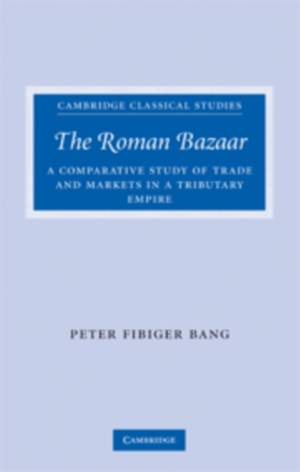
- Afhalen na 1 uur in een winkel met voorraad
- Gratis thuislevering in België vanaf € 30
- Ruim aanbod met 7 miljoen producten
- Afhalen na 1 uur in een winkel met voorraad
- Gratis thuislevering in België vanaf € 30
- Ruim aanbod met 7 miljoen producten
Zoeken
€ 136,95
+ 273 punten
Uitvoering
Omschrijving
It has long been held by historians that trade and markets in the Roman Empire resembled those found later in early modern Europe. Using the concept of the bazaar, however, Peter Bang argues that the development spawned by Roman hegemony proves clear similarities with large, pre-colonial or tributary empires such as the Ottoman, the Mughal in India, and the Ming/Ch'ing in China. By comparing Roman market formation particularly with conditions in the Mughal Empire, Bang changes our comparative horizons and situates the ongoing debate over the Roman economy firmly within wider discussions about world history and the 'great divergence' between east and west. The broad scope of this book takes in a wide range of topics, from communal networks and family connections to imperial cultures of consumption, and will therefore be of great interest to scholars and students of ancient history and pre-industrial economics.
Specificaties
Betrokkenen
- Auteur(s):
- Uitgeverij:
Inhoud
- Aantal bladzijden:
- 376
- Taal:
- Engels
- Reeks:
Eigenschappen
- Productcode (EAN):
- 9780521855327
- Verschijningsdatum:
- 5/01/2009
- Uitvoering:
- Hardcover
- Formaat:
- Ongenaaid / garenloos gebonden
- Afmetingen:
- 140 mm x 216 mm
- Gewicht:
- 612 g

Alleen bij Standaard Boekhandel
+ 273 punten op je klantenkaart van Standaard Boekhandel
Beoordelingen
We publiceren alleen reviews die voldoen aan de voorwaarden voor reviews. Bekijk onze voorwaarden voor reviews.











